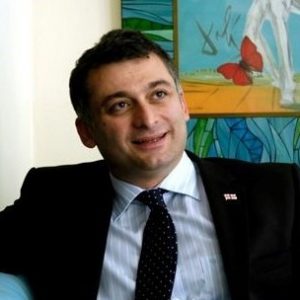Truth in the Age of COVID-19: Three Steps to Combating Disinformation
Dexis Consulting Group and our featured panelists discussed approaches to detect and combat disinformation on June 4, 2020.
As the global COVID-19 pandemic threatens public health and global alliances, so does the rising tide of disinformation, creating mistrust in global norms, threatening democratic institutions, and polarizing societies. Donors, private sector, governments, and civil society are using data analytics, public awareness and public policy, and strategic communications to detect and quell disinformation, but often these activities are not linked. Leading experts in technology, civil society, and the entertainment industry discussed how data analytics, awareness-raising, and engaging audiences with appealing media, when combined, enable communities to become more resilient. This was the first of a three-part webinar series to explore all three facets of an integrated approach to quelling the personal and global impact of disinformation.
Disinformation has a long history before the age of social media and COVID-19 and relies on psychology, cognitive science, society, and people to mitigate its impact. Its intent is to take a kernel of truth and alter the context, mislead, magnify divisions, create discord, and erode people’s trust in institutions, leaders, and the truth. Panelists moved beyond the disinformation narratives at play to look at what can work when these three steps work together: 1) analysis to detect disinformation and understand motivations, sources, key influences, and narratives behind it; 2) awareness-raising media literacy, fact-checking, and dialogue; and 3) audience engagement through the entertainment education model.
President and CEO of IST Research Ryan Paterson, led us off with describing the dynamics of population engagement and social listening IT tools, which have shown a tremendous variety in apps people use that vary greatly by region and security: “You often don’t start and end a conversation on the same platform.” Social listening collects what is on the surface of the web. The overlay of these tools can help engage in combating disinformation in real time. For COVID-19, this can result in reaching over 300,000 peoples’ conversations and questions on medications, morbidity rates, and health education in a click or two.
Executive Director of Georgia’s Reforms Associates (GRASS), Paata Gaprindashvili advised that when you have the data and when it comes to public outreach, online fact-checking solely cannot cure all the disinformation evils but is one of many important awareness-raising tools.
“During the pandemic GRASS increased its online outreach, with over half a million reach per week (a lot for Georgia’s 3.7 million population). However, without proper engagement with Facebook and other tech companies as well as cooperation with traditional media, such as TV, fact-checking activities alone cannot be a solution to the disinformation. No matter how much is fact-checked by organizations like us, if tech companies do not support the work of this type, disinformation would continue spreading faster than COVID-19. What is needed can be summarized in three words: ‘whole-of-society approach of dealing with disinformation and hybrid threats.” This approach entails the cooperation of all the stakeholders, including the government, the parliament, education institutions, civil society, private sector, tech, and cyber companies: “And when we are talking about COVID-19, then there are also doctors and healthcare specialists who need to be part of counter disinformation efforts.”
Johanna Blakley, Managing Director of the Norman Lear Center, shared how the entertainment education model, which has been around since the 1970s, incorporates pro-social educational messages into entertainment programming and finds audiences where they already are. “This method can have a huge impact on audience awareness of topics, their knowledge about issues can trigger changes in attitudes and behavior.” From movies like Contagion to over 1,000 storylines the Center and Hollywood, Health, and Society program produced in consultation with partners in the Center for Disease Control, Hollywood, and in India, Nigeria, and Colombia, entertainment media can reach difficult-to-reach key audiences with life-saving messages.
“A key aspect of our survey research is ascertaining to what degree audience members have been transported by a story. It turns out that this quite often is the crucial factor in positive outcomes.” Blakley shared several data-backed examples, including how viewership to a new nighttime soap opera in India on pentavalent vaccine showed a steady increase in understanding of what the vaccine protects against. “We are talking about effective storytelling and engagement. Finding people where they are and asking them to contribute to a conversation about socially crucial topics. I think this is a key part of any sort of model to shift opinions and to share accurate information around the world,” said Blakley.
Dialogues with Dexis is an external webinar series to discuss emerging trends and analysis with experts and innovators in conflict prevention, stabilization, and global security.
Speakers




Speaker Bios
Ryan Paterson, President and CEO, IST Research
Ryan Paterson brings over 20 years of broad experience leading in the United States Marine Corps, Defense Advanced Research Projects Agency (DARPA), defense acquisitions, and small business operations. Mr. Paterson is the founder, president and Chief Executive Officer of IST Research supporting customers around the globe. He has served twice at DARPA. Mr. Paterson’s Marine Corps experience includes training, deployments, and operations as an armor officer at the platoon, company, and battalion levels. Mr. Paterson has also founded two small businesses focused on leadership and technology development. Mr. Paterson has a proven track record of leading and managing complex, cutting edge technology programs, deploying emerging technologies into joint operational combat environments, and transitioning various technologies into the acquisition community. Mr. Paterson holds a BS in Mathematics from Virginia Tech and a MS in Applied Mathematics from the Naval Postgraduate School.
Paata Gaprindashvili, Executive Director, Georgia’s Reforms Associates (GRASS)
Paata Gaprindashvili holds the position of Georgia’s Reforms Associates (GRASS)’s, Director since June 2016. Established in 2012, GRASS is a non-partisan, non-governmental policy watchdog and multi-profile think tank which provides policy recommendations to the government, conducts research-based analysis and raises public interest and awareness on a wide range of public policy issues. Before taking a position of a Director Paata served as a Vice Director at GRASS and Editor-in-Chief of analytical-and-information online service FactCheck Georgia, established by GRASS in April 2013. In 2009-2013, he was Georgia’s Permanent Representative to the OSCE. Since joining the diplomatic service in 1994, Paata has participated in several international talks and has led Georgian delegations in various negotiations held on issues related to Georgia.
Johanna Blakley, Managing Director, Norman Lear Center
Johanna Blakley is the managing director at the Norman Lear Center, a nonpartisan research and public policy center that studies the social, political, economic, and cultural impact of entertainment and media on the world. Based at the USC Annenberg School for Communication and Journalism, Johanna performs research on entertainment education, cultural diplomacy, and politics and entertainment. She is co-principal investigator on the Media Impact Project (MIP), which seeks to better understand the role that media plays in changing knowledge, attitudes and behavior among individuals and communities around the world. Recent MIP work includes analyzing depictions of Africa, immigration, race and poverty in U.S. media, and conducting research on the relationship between political ideology and entertainment preferences. Johanna also oversees research and evaluation for two State Department cultural exchange programs: American Film Showcase and the Middle East Media Initiative. Johanna received a PhD in English from the University of California, Santa Barbara, where she taught courses on popular culture; at USC, she has developed and taught masters courses on transmedia storytelling.
Moderator Bio
Tamara Babiuk, Senior Director, Center for Global Security and Stabilization, Dexis
Tamara serves as Co-Director of Dexis’ Center for Global Security and Stabilization, driving thought leadership and project design that address some of the world’s most pressing security and stabilization issues. Tamara has designed and managed projects in Europe, the Middle East, Asia, and Africa. At Chemonics International, she led a department that fostered knowledge sharing across the company’s technical areas. She was an adjunct professor for Georgetown University’s Center for Social Impact Communications, served as Chief of Mission and Associate Expert with the International Organization for Migration, and was a Program Officer with USAID/Ukraine. She is fluent in Ukrainian and speaks French.




